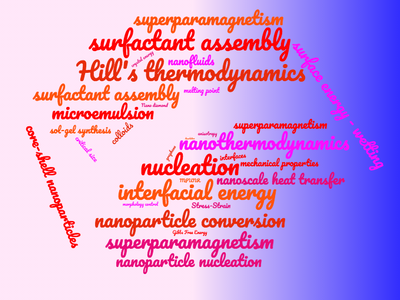Denna kurs betraktar termisk energiöverföring från både makroskopiska och mikroskopiska perspektiv baserat på de fundamentala principerna och lagarna för termodynamik och statistisk mekanik. Kursen syftar till att ge en djup förståelse för termodynamiska materialprinciper och tillämpningar för tillverkning av oorganiska material (tunnfilmer, bulk), urval av material för fientliga miljöer, processer för adsorption och kemisorption, ytor och övergångar, fasjämvikter och fasövergångar, statistisk och ojämviktstermodynamik, kapillära processer och kolloidala system. En viktigt aspekt är introduktionen av nanotermodynamik: termodynamiken för fenomen och processer i nanometerskala.
SK2773 Nanotermodynamik 7,5 hp
Denna kurs är under avveckling.
Avvecklingsbeslut:
Ingen information tillagd
Information per kursomgång
Kursomgångar saknas för aktuella eller kommande terminer.
Kursplan som PDF
Notera: all information från kursplanen visas i tillgängligt format på denna sida.
Kursplan SK2773 (VT 2025–)Innehåll och lärandemål
Kursinnehåll
Lärandemål
Efter slutförd kurs ska studenten kunna:
- Definiera fundamentala termodynamiska parametrar, deras inbördes relation för kemiska processer, och beräkna termodynamiska samband för en given process,
- Förklara och demonstrera användningen av Ellingham- och Pourbaix-diagram,
- Tillämpa termodynamik på defekter, fasjämvikter, fasdiagram, och fasövergångar i nanosystem,
- Förklara de grundläggande principerna i statistisk termodynamik,
- Förklara de termodynamiska egenskaperna hos kolloidala dispergerade system, återge skillnader mot klassisk termodynamik.
Kurslitteratur och förberedelser
Särskild behörighet
Engelska B/Engelska 6
Kandidatexamen i fysik, elektroteknik, materialvetenskap, kemi eller motsvarande, inklusive kurser i matematik motsvarande minst 20 hp och kurser i fysik motsvarande minst 30 hp.
Kurslitteratur
Examination och slutförande
Betygsskala
Examination
- INL1 - Inlämningsuppgift, 1,0 hp, betygsskala: P, F
- INL2 - Inlämningsuppgift, 2,5 hp, betygsskala: A, B, C, D, E, FX, F
- TEN1 - Skriftlig tentamen, 4,0 hp, betygsskala: A, B, C, D, E, FX, F
Examinator beslutar, baserat på rekommendation från KTH:s handläggare av stöd till studenter med funktionsnedsättning, om eventuell anpassad examination för studenter med dokumenterad, varaktig funktionsnedsättning.
Examinator får medge annan examinationsform vid omexamination av enstaka studenter.
När kurs inte längre ges har student möjlighet att examineras under ytterligare två läsår.
Övriga krav för slutbetyg
Båda inlämningsuppgifterna och tentamen är obligatoriska för slutbetyg för kursen.
Examinator
Etiskt förhållningssätt
- Vid grupparbete har alla i gruppen ansvar för gruppens arbete.
- Vid examination ska varje student ärligt redovisa hjälp som erhållits och källor som använts.
- Vid muntlig examination ska varje student kunna redogöra för hela uppgiften och hela lösningen.